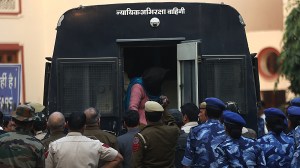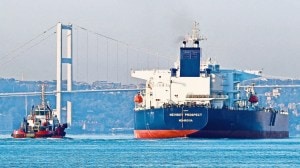Celebrate Cancun, but with caution
Arun Jaitley, the Commerce Minister, has a neat, legal mind. Before he went to Cancun, he had identified the three possible results of the m...

Arun Jaitley, the Commerce Minister, has a neat, legal mind. Before he went to Cancun, he had identified the three possible results of the ministerial meeting: good deal, no deal or bad deal. And he had concluded that while a good deal would be the most desirable result, no deal was certainly better than a bad deal.
The chances of a good deal were always poor. The United States and the European Union had come together to present a common draft on agriculture. That was a formidable alliance. Both subsidise their agriculture. Both are major producers and exporters of agricultural products. Both have difficult political constituencies at home.
The Dealbreaker
It is the coming together of the US and the EU that triggered an opposition alliance led by India, China and Mexico. Eventually 21 countries — including some Cairn group countries — joined the alliance. That too was a powerful alliance and its strength was derived from the number of countries, their populations and their capacity to produce and export large quantities of farm products.
With the two alliances locked in mortal combat, the question was who will blink first? To the credit of the 21-nation alliance, it did not blink. Agriculture turned out to be the deal-breaker at Cancun. When there was no agreement on agriculture, attempts to negotiate agreements on some other issues collapsed in no time.
Jaitley has returned home to a hero’s welcome. He deserves to savour the moment of his triumph. A ‘no deal’ has made him look like a winner, but I would like to caution him that, in the long run, a ‘no deal’ will hurt India and other developing countries. The whole basis of the World Trade Organisation is dealmaking — or agreements if you wish — and it is the capacity of ministers to produce agreements that has made the WTO a very different kind of international body. In an earlier column I had pointed out that the WTO is the only international organisation whose rules bind every member-country.
Since the beginning of the Uruguay Round, member-countries have concluded many agreements. Some — for example TRIPS — have remained controversial, but it cannot be gainsaid that the TRIPS agreement has given a boost to invention and the protection of intellectual property. A country like India with immense human and intellectual resources has come around to the view that it will gain more through protection of intellectual property rather than denying such protection. Indian pharmaceutical producers want recognition and protection for patents — a complete turnabout from the position they took in the early 1990s.
TRIPS had its downside. Poor countries feared that they may not be able to deal with a crisis and they will be at the mercy of international pharmaceutical companies. Their fears were genuine and, after protracted negotiations, another agreement was reached in Geneva on the eve of the Cancun meeting. Many, if not all, of the concerns of poor countries regarding import or compulsory licensing of drugs in an emergency have been addressed in the new agreement.
The Multi Fibre Agreement is another agreement that has helped developing countries like India. When the MFA’s term was about to expire in 1995, it was India that pressed for a ten-year extension. MFA restricts competition, but India wanted such restrictions to continue — in the form of quotas — to gain time to modernise its textile industry and acquire competitive strength. MFA’s term will come to an end in 2005 and I shall not be surprised if sections of India’s textile industry pressure the government to negotiate another extension.
The point is that agreements are at the heart of the WTO. Agreements lay down rules. The rules are binding on all member-countries. If the rules are broken, there is a dispute resolution body. Its rulings are binding upon the disputants. There is also an appellate body. So far, the two bodies have been remarkably neutral and free from bias. They have ruled against countries like the US.
India no David
Some people would like India to play David forever in an imaginary David versus Goliath battle. I suspect they would like India to remain a ‘developing’ country forever. I suspect they would also like the bulk of Indians to remain poor forever. The sooner India shakes off this ‘forever poor’ obsession, the better India and Indians will be.
India needs more agreements in the WTO. So does every other country. A ‘no deal’ WTO will hurt the developing countries more than the developed countries. If no agreements are reached in the WTO, that does not mean there will be no agreements at all. In that event, there will be more Regional Trading Agreements (RTA), multilateral or bilateral agreements and, worse, sweetheart deals.
Regional groupings such as NAFTA, ASEAN, MERCOSUR will gain strength. The US and the EU will offer, separately or together, bilateral agreements to many developing countries, and many of them will take up such offers. The worst situation will be if sweetheart deals proliferate. A developed country will pick one more poor countries and offer them special deals that the latter will find difficult to resist. In such a situation, if India sticks to its ‘no deal’ position, India will find itself left out in the cold.
No alliances are permanent. Alliances can be broken. New alliances can be forged to put spokes in the wheel. As Jaitley discovered, Botswana was propped up to derail the Cancun meeting by resurrecting opposition to one of the Singapore issues and shifting the attention away from agriculture.
Meanwhile, India must also use RTAs as building blocks. India’s relationship with ASEAN or the Asian Regional Forum (ARF) is still tenuous: we must seek a closer trading relationship even if it falls short of full membership. The Indian Ocean Rim has failed to take off. That leaves only SAPTA or its more ambitious version, SAFTA. If Pakistan remains a stumbling block, India must boldly offer SAPTA/SAFTA to the remaining five neighbours. India should also explore the possibility of a full-fledged bilateral trade treaty with China.
All these steps must eventually lead to more agreements under the umbrella of the WTO. A ‘no deal’ at Cancun may have the flavour of victory, but a permanent stance of ‘no deals’ or ‘no more deals’ will permanently rob India of the potential to grow into a developed and strong economy.
Write to the author at pcexpressindia.com



- 01
- 02
- 03
- 04
- 05




























